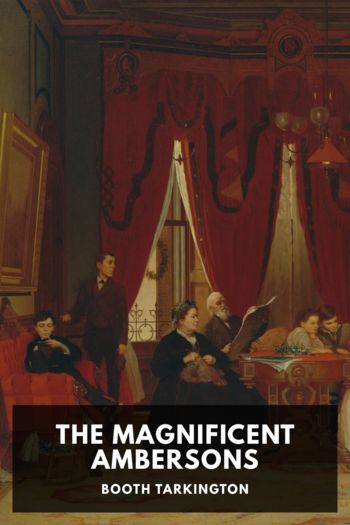Alice Adams by Booth Tarkington (ebook reader macos TXT) 📕

- Author: Booth Tarkington
Book online «Alice Adams by Booth Tarkington (ebook reader macos TXT) 📕». Author Booth Tarkington
“Not at all,” Alice said.
“Well, I mind!” he said. “I wish you could understand that when I want to dance with any girl I don’t need my mother to ask her for me. I really am more than six years old!”
He spoke with too much vehemence, and Mrs. Dowling at once saw how to have her way. As with husbands and wives, so with many fathers and daughters, and so with some sons and mothers: the man will himself be cross in public and think nothing of it, nor will he greatly mind a little crossness on the part of the woman; but let her show agitation before any spectator, he is instantly reduced to a coward’s slavery. Women understand that ancient weakness, of course; for it is one of their most important means of defense, but can be used ignobly.
Mrs. Dowling permitted a tremulousness to become audible in her voice. “It isn’t very—very pleasant—to be talked to like that by your own son—before strangers!”
“Oh, my! Look here!” the stricken Dowling protested. “I didn’t say anything, mother. I was just joking about how you never get over thinking I’m a little boy. I only—”
Mrs. Dowling continued: “I just thought I was doing you a little favour. I didn’t think it would make you so angry.”
“Mother, for goodness’ sake! Miss Adams’ll think—”
“I suppose,” Mrs. Dowling interrupted, piteously, “I suppose it doesn’t matter what I think!”
“Oh, gracious!”
Alice interfered; she perceived that the ruthless Mrs. Dowling meant to have her way. “I think you’d better go, Frank. Really.”
“There!” his mother cried. “Miss Adams says so, herself! What more do you want?”
“Oh, gracious!” he lamented again, and, with a sick look over his shoulder at Alice, permitted his mother to take his arm and propel him away. Mrs. Dowling’s spirits had strikingly recovered even before the pair passed from the corridor: she moved almost bouncingly beside her embittered son, and her eyes and all the convolutions of her abundant face were blithe.
Alice went in search of Walter, but without much hope of finding him. What he did with himself at frozen-face dances was one of his most successful mysteries, and her present excursion gave her no clue leading to its solution. When the musicians again lowered their instruments for an interval she had returned, alone, to her former seat within the partial shelter of the box-trees.
She had now to practice an art that affords but a limited variety of methods, even to the expert: the art of seeming to have an escort or partner when there is none. The practitioner must imply, merely by expression and attitude, that the supposed companion has left her for only a few moments, that she herself has sent him upon an errand; and, if possible, the minds of observers must be directed toward a conclusion that this errand of her devising is an amusing one; at all events, she is alone temporarily and of choice, not deserted. She awaits a devoted man who may return at any instant.
Other people desired to sit in Alice’s nook, but discovered her in occupancy. She had moved the vacant chair closer to her own, and she sat with her arm extended so that her hand, holding her lace kerchief, rested upon the back of this second chair, claiming it. Such a preemption, like that of a traveller’s bag in the rack, was unquestionable; and, for additional evidence, sitting with her knees crossed, she kept one foot continuously moving a little, in cadence with the other, which tapped the floor. Moreover, she added a fine detail: her half-smile, with the under lip caught, seemed to struggle against repression, as if she found the service engaging her absent companion even more amusing than she would let him see when he returned: there was jovial intrigue of some sort afoot, evidently. Her eyes, beaming with secret fun, were averted from intruders, but sometimes, when couples approached, seeking possession of the nook, her thoughts about the absentee appeared to threaten her with outright laughter; and though one or two girls looked at her skeptically, as they turned away, their escorts felt no such doubts, and merely wondered what importantly funny affair Alice Adams was engaged in. She had learned to do it perfectly.
She had learned it during the last two years; she was twenty when for the first time she had the shock of finding herself without an applicant for one of her dances. When she was sixteen “all the nice boys in town,” as her mother said, crowded the Adamses’ small veranda and steps, or sat near by, cross-legged on the lawn, on summer evenings; and at eighteen she had replaced the boys with “the older men.” By this time most of “the other girls,” her contemporaries, were away at school or college, and when they came home to stay, they “came out”—that feeble revival of an ancient custom offering the maiden to the ceremonial inspection of the tribe. Alice neither went away nor “came out,” and, in contrast with those who did, she may have seemed to lack freshness of lustre—jewels are richest when revealed all new in a white velvet box. And Alice may have been too eager to secure new retainers, too kind in her efforts to keep the old ones. She had been a belle too soon.
VIIIThe device of the absentee partner has the defect that it cannot be employed for longer than ten or fifteen minutes at a time, and it may not be repeated more than twice in one evening: a single repetition, indeed, is weak, and may prove a betrayal. Alice knew that her present performance could be effective during only this interval between dances; and though her eyes were guarded, she anxiously counted over the partnerless young men who lounged together in the doorways within her view. Every one of them ought to have asked her for dances, she thought, and although she might





Comments (0)